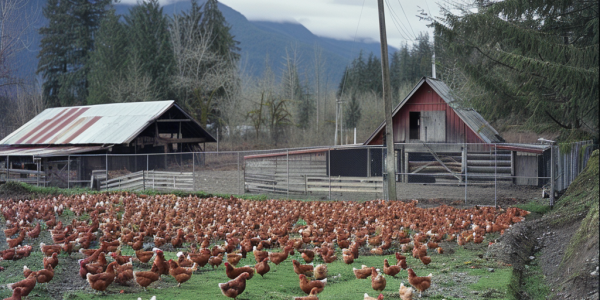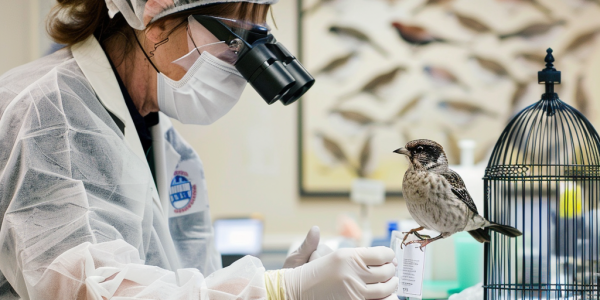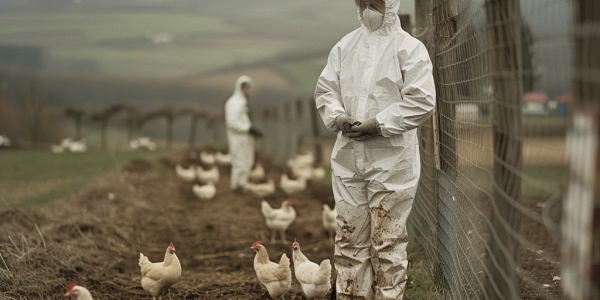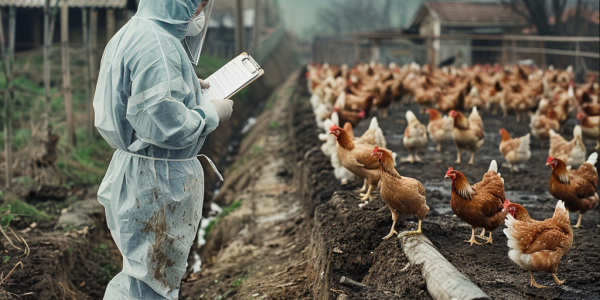First Presumptive Human Case of Avian Influenza Reported in British Columbia
Health authorities in British Columbia are investigating a presumptive human case of avian influenza, marking a significant public health concern. A teenager tested positive for the virus, prompting immediate action. Experts emphasize the importance of understanding transmission risks and practicing good hygiene, particularly for those in close contact with birds. Vaccination is recommended for high-risk individuals. Stay informed as health officials monitor the situation and provide updates on preventive measures against avian flu.
Avian Influenza Outbreaks Lead to Quarantine of Poultry Farms in British Columbia
Six commercial poultry farms in British Columbia’s Fraser Valley have been quarantined due to outbreaks of highly pathogenic avian influenza (HPAI), marking a significant resurgence after an eight-month lull. The Canadian Food Inspection Agency (CFIA) has confirmed the outbreaks, affecting over six million birds, and has established control zones to prevent further spread. As the poultry industry braces for potential economic impacts, stakeholders are urged to enhance biosecurity measures and stay vigilant in monitoring flock health.
HPAI Confirmed in Pig on Oregon Farm, Quarantine Imposed
The National Veterinary Services Laboratories (NVSL) has confirmed Highly Pathogenic Avian Influenza (HPAI) in a pig on a farm in Crook County, Oregon. This significant development raises concerns for livestock health and biosecurity. Authorities have implemented strict quarantine measures and are conducting surveillance to prevent further spread. Health experts assure that properly prepared poultry and livestock products remain safe for consumption. The situation underscores the importance of biosecurity practices among livestock owners to safeguard animal health.
Study Highlights Lethal Transmissibility of Bovine H5N1 Influenza
A new study in Nature reveals the transmissibility and lethal potential of the bovine H5N1 influenza virus, huTX37-H5N1, highlighting significant public health concerns. Isolated from a farm worker, this strain can be transmitted between animals and poses a threat to humans, with findings indicating its ability to replicate in human cells. Researchers emphasize the need for enhanced surveillance and monitoring of H5N1 viruses amid ongoing outbreaks.
Missouri Investigation Finds No Human-to-Human Transmission of Avian Influenza
An investigation into a suspected cluster of avian influenza cases in Missouri has found no evidence of human-to-human transmission, reassuring health officials amid rising human cases nationwide. The CDC and local authorities are enhancing surveillance and public education to mitigate risks associated with bird flu, emphasizing the need for vigilance and preventive measures.
Slovakia Faces Major Avian Influenza Outbreak Amid Regional Concerns
Slovakia faces a severe avian influenza outbreak, confirmed by the World Organisation for Animal Health, with the H5N1 strain leading to the death of 200 birds and the culling of over 40,000 more. As concerns rise across Europe, health officials urge enhanced biosecurity measures to protect poultry and prevent economic impacts on the industry.
Study Highlights Risks of Avian Influenza Spillover in Malaysian Borneo
A recent study published in Nature Communications highlights the risks of H5 avian influenza in Malaysian Borneo, emphasizing the connection between deforestation, increased human-animal interactions, and the potential for zoonotic spillover events. With H5N1 viruses posing a 60% mortality rate in humans, this research underscores the urgent need for surveillance and proactive measures to mitigate the risks associated with emerging infectious diseases.
U.S. Doubling Bird Flu Vaccine Stockpile Amid Rising Infections
Federal officials are doubling the stockpile of emergency bird flu vaccines to 10 million doses amid rising H5N1 infections in humans and livestock. This initiative, backed by $72 million in funding for three pharmaceutical companies, aims to enhance public health preparedness and ensure swift distribution of vaccines. With 16 confirmed human cases this year, health officials stress the importance of monitoring avian influenza risks and maintaining safety in agricultural communities.
H5N1 Avian Influenza Outbreaks Reported in Hungary and Italy
Hungary and Italy have reported new outbreaks of the H5N1 avian influenza virus, marking a significant resurgence of bird flu in Europe. The World Organisation for Animal Health (WOAH) confirmed these cases, prompting immediate biosecurity measures on affected farms. With the potential for severe economic impacts on the poultry industry, authorities urge vigilance among farmers to report unusual mortality rates. As migratory birds can spread the virus, ongoing collaboration and enhanced surveillance are crucial to mitigate future outbreaks.
Tragic Bird Flu Outbreak Claims Lives of Tigers and Lions in Vietnam
A devastating bird flu outbreak in southern Vietnam has led to the deaths of dozens of tigers, three lions, and a panther at two zoos. The H5N1 strain of avian influenza, likely contracted through contaminated chicken, has raised alarms among wildlife authorities and health officials. As investigations continue, the World Health Organization warns about the risks of consuming raw or undercooked poultry from affected areas. This incident underscores the urgent need for effective wildlife management and public health vigilance.










